Waiting for Abigail Fisher
Monday mornings at the Supreme Court in May and June are opinion days, so where is the opinion in Fisher v. University of Texas?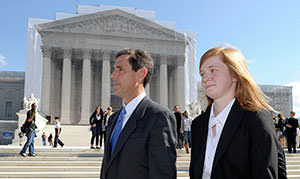
Monday mornings at the Supreme Court in May and June are opinion days, when the high tribunal publicly announces its decisions. So where, you might ask now that another Monday has come and gone, is the opinion in Fisher v. University of Texas, the constitutional challenge brought by former student Abigail Fisher to the University of Texas’ race-conscious undergraduate affirmative action admissions policy?
Although the court released a highly fractured and very important 5-4 ruling Monday in the case of Maryland v. King, upholding the right of police to routinely take DNA samples from criminal suspects, the silence on Fisher has garnered most of the media’s attention and concern.
Argued in October, Fisher should have come down by now, well in advance of the court’s other highly anticipated rulings on the issues of voting rights and same-sex marriage, which were argued in February and March, respectively.
The answer to the delay could be anything from a last minute technical dispute aimed at ironing out the precise wording of the eventual majority opinion to a full-blown internal political fracture over the constitutionality of affirmative action that has left the justices torn and the court as an institution at least temporarily paralyzed.
Although I’m banking on some version of political fracture as the culprit, it’s worth looking first at the possible technical reasons for the delay. Writing in Education Week’s School Law blog, legal reporter Mark Walsh has offered four potential scenarios:
1. The task of preparing the majority opinion has been assigned to Anthony Kennedy, who is the only justice yet to write an opinion on the cases that were orally argued in October. The long delay, Walsh speculates, could simply be a function of the intellectual back and forth and resulting additional time required to secure majority agreement with Kennedy’s comparatively moderate outlook.
2. Regardless of who is preparing the majority opinion, the court is taking its time to avoid a 4-4 tie, which may occur since Justice Elena Kagan, who normally would be expected to support affirmative action, has recused herself from participating in the case. In the event of a 4-4 deadlock, any non-majority opinions issued by the justices would lack precedential value, leaving UT’s affirmative action program intact.
3. After all the fuss and excitement, no consensus on the merits may be in reach, and the court, after an additional week of haggling, will dismiss the case on procedural grounds, most likely because Fisher has graduated from college, albeit from Louisiana State rather than UT, and, as a result, no longer has standing to sue.
4. The court will hold the decision in Fisher in abeyance until it hears another affirmative action case from Michigan that it has agreed to review next term — Schuette v. Coalition to Defend Affirmative Action — which presents an even broader challenge to race-conscious admissions programs than Fisher.
Although any of the possibilities sketched by Walsh could prove correct, a more political explanation may hold the key to understanding the delay in Fisher. It’s possible the court’s conservatives are working to overturn UT’s admissions policy but are waiting to do so until they have also secured a conservative majority in the case of Shelby County v. Holder. Conservatives are hoping with that case to overturn Section 5 of the Voting Rights Act, the provision that requires states and local jurisdictions with a chronic history of discrimination in elections to obtain approval, or “preclearance,” from either the Justice Department or a federal court before implementing election changes.
The key to assembling any such majority in either Fisher or Shelby County may well be winning over Kennedy, but the driving force likely will be Justice Antonin Scalia. Notwithstanding Scalia’s decision to vote with three of the court’s liberals in the dissent in the King case on DNA testing and the fact that in the past he has occasionally stepped out of character to uphold the right of criminal defendants to confront adverse witnesses at trial, Scalia remains the court’s right-wing ideological heart and soul.
In that role, Scalia has been a longtime and highly vocal foe of even the most tepid legal uses of racial preferences, condemning minority set-asides in government contracts in 1995 as unjust racial entitlements that serve only to reinforce race hatred (Adarand Constructors Inc. v. Pena), and voting unsuccessfully in a dissenting opinion to end affirmative action in higher education in the Supreme Court’s 2003 decision in Grutter v. Bollinger. In February’s oral argument in Shelby County, Scalia offered the same diatribe against racial entitlements as a reason for striking down the preclearance rules of the Voting Rights Act.
For Scalia and the conservative majority he no doubt hopes to forge, the issues raised in Fisher and Shelby County, while concerned on the surface with subjects as diverse as education and voting, call for a unified and fundamental resolution: putting an end to the affirmative use of race as a means of ameliorating past and present social, economic and political discrimination.
It is by no means assured, of course, that Scalia’s views will win over a majority of justices in either case. Nor is it likely, with three Mondays remaining in June, that the court will release its rulings on both cases on the same day, if only to keep a lid on negative public reaction. But whatever ruling is published first, it’s a fair bet that the delay in Fisher to date has less to do with technical and procedural disputes among the justices than it does with their most basic views on constitutional law and the nation’s core values of justice and fairness.
Your support matters…Independent journalism is under threat and overshadowed by heavily funded mainstream media.
You can help level the playing field. Become a member.
Your tax-deductible contribution keeps us digging beneath the headlines to give you thought-provoking, investigative reporting and analysis that unearths what's really happening- without compromise.
Give today to support our courageous, independent journalists.


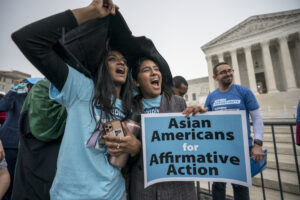
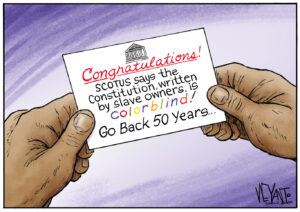
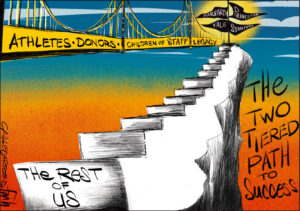

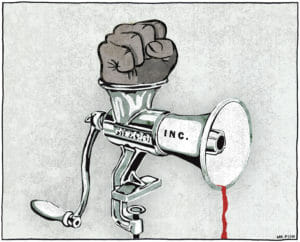


You need to be a supporter to comment.
There are currently no responses to this article.
Be the first to respond.